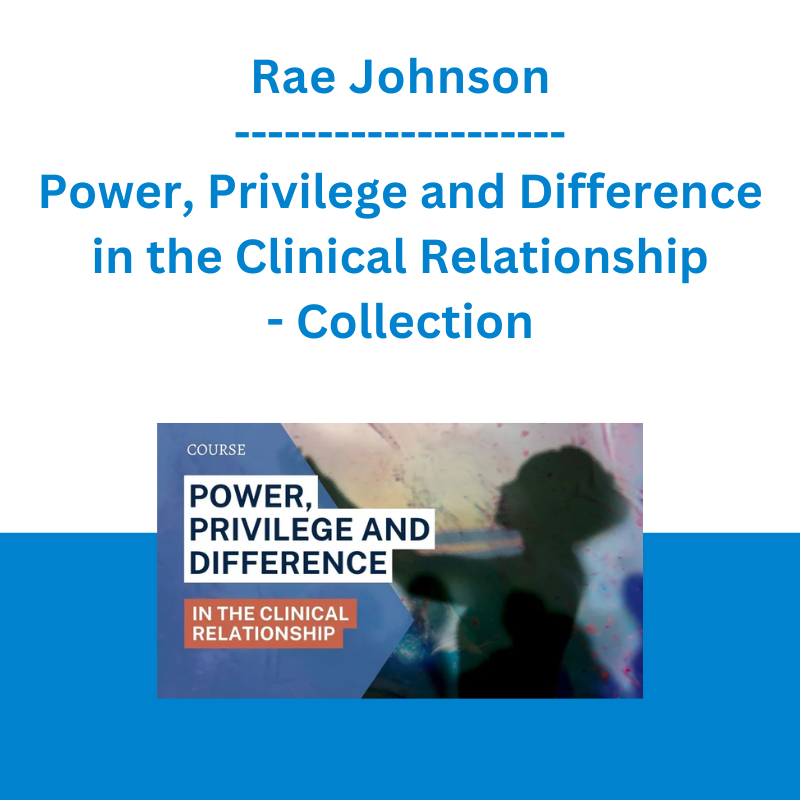*** Proof of Product ***
Exploring the Essential Features of “Rae Johnson – Power, Privilege and Difference in the Clinical Relationship – Collection”
About
Power dynamics pervade all of our interpersonal relationships, and the therapeutic relationship is no exception.
This course will provide students with critical information about how power dynamics play out in the context of body-to-body interactions, with special emphasis on how the ongoing dance of nonverbal communication between therapist and client can support trust, rapport, and empathy.
Using an intersectional approach, students will have an opportunity to experience and practice working with key concepts such as kinesthetic empathy, asymmetrical nonverbal interactions, performativity, and body norms.
Module 1: Beginning with Ourselves
Unpacking and transforming the complex power relationships between practitioner and client requires that the practitioner be willing to undertake an examination of their own relationship to social power, their own history of oppression and privilege, and how their lived experiences show up in their own bodies. This module is intended to support a process of gentle but rigorous self-discovery that allows practitioners to begin to identify their blind spots and become more transparent and responsive in navigating power differentials with their clients.
Module 2: Understanding & Transforming the Embodied Experience of Oppression
This module provides the conceptual underpinnings for an embodied approach to understanding oppression, including a discussion of nonverbal microaggressions, asymmetrical nonverbal interactions, and the traumatic impact of oppression.
Module 3: Working with the Embodied Experience of Oppression
Module 3 introduces a model for working with the embodied experiences of oppression that clients bring to a mindbody therapy session, and provides strategies for facilitating the exploration of each phase of the model.
Module 4: Body Stories as Inquiry and Integration
Our bodies hold our experiences of oppression as much as our minds do – perhaps more. This module explores how creating and sharing embodied narratives (body stories) can be a path for healing and transformation in the context of mindbody therapy.
Students who take this course will:
How to appreciate the role that their own lived experience plays in the clinical relationship
Identify potential triggers and blind spots in their understanding of power, privilege and difference
Identify nonverbal microaggressions in the clinical relationship
Understand our bodies as sites for sociocultural norms
Recognize asymmetrical interactions between client and practitioner
Work with experience, reflection, meaning making, and experimentation in the process of transforming embodied experiences of oppression
Appreciate oppression as something we learn and can unlearn
Recognize the role of body stories in the therapy process, and when they might be contraindicated
Trace the similarities and differences across a variety of body stories
Utilize somatic techniques for developing body stories with clients
Author
Rae Johnson
Dr. Rae Johnson, Ph.D., RSMT, is a scholar/activist and registered somatic movement therapist who chairs the Somatic Studies in Depth Psychology doctoral program at Pacifica Graduate Institute. The author of several books, including Elemental Movement, Knowing in our Bones, and Embodied Social Justice, Rae teaches and trains internationally on embodied activism, somatic research methods, and the poetic body.
Please see the full list of alternative group-buy courses available here: https://lunacourse.com/shop/










 Matan Feldman - The 13-Week Cash Flow Modeling - Wall Street Prep
Matan Feldman - The 13-Week Cash Flow Modeling - Wall Street Prep  Team NFT Money - Ultimate NFT Playbook
Team NFT Money - Ultimate NFT Playbook  Alphashark - The AlphaShark SV-Scalper
Alphashark - The AlphaShark SV-Scalper  Crypto Dan - The Crypto Investing Blueprint To Financial Freedom By 2025
Crypto Dan - The Crypto Investing Blueprint To Financial Freedom By 2025  Greg Loehr - Advanced Option Trading With Broken Wing Butterflies
Greg Loehr - Advanced Option Trading With Broken Wing Butterflies  SMB - Options Training
SMB - Options Training  Chris Capre - Advanced Price Action Ongoing Training & Webinars
Chris Capre - Advanced Price Action Ongoing Training & Webinars  Julie Stoian & Cathy Olson - Launch Gorgeous - Funnel Gorgeous Bundle
Julie Stoian & Cathy Olson - Launch Gorgeous - Funnel Gorgeous Bundle  Matthew Kratter - Trader University
Matthew Kratter - Trader University